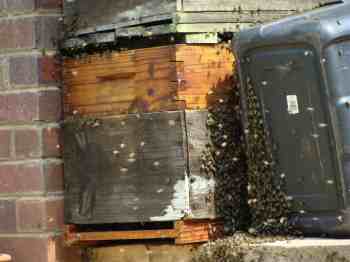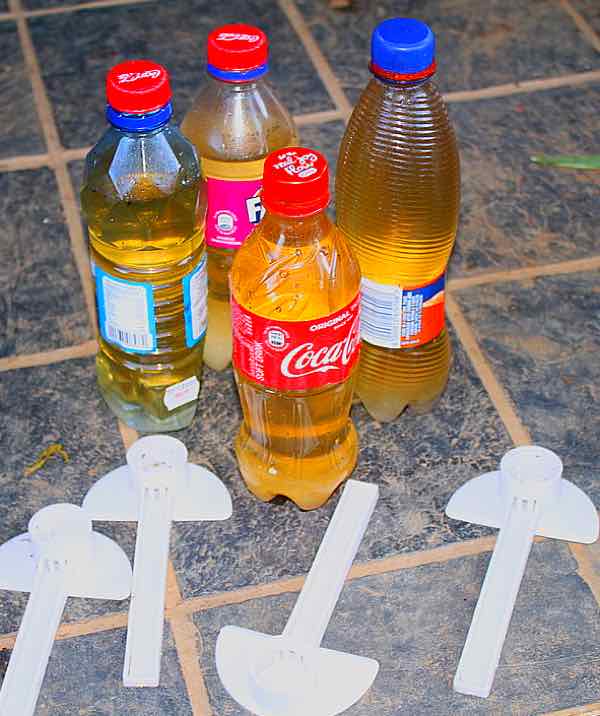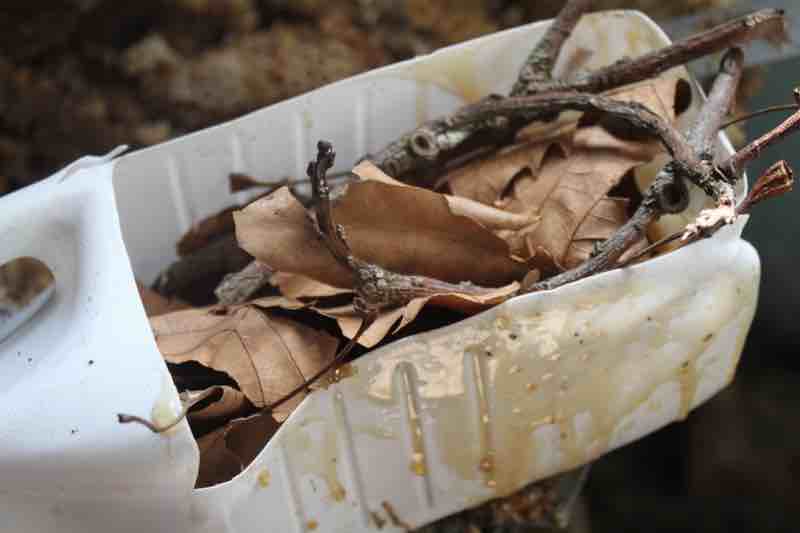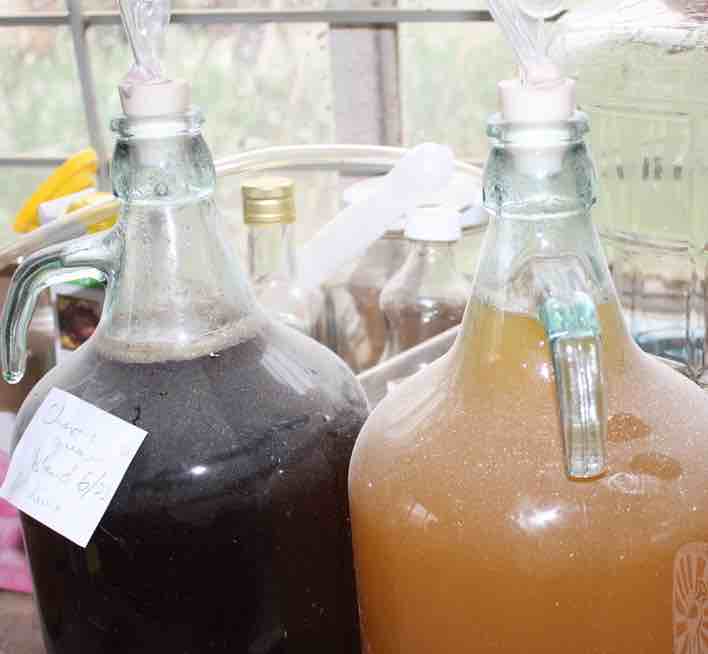- Homepage
- Beekeeping
- Hiving a Colony So That It Does Not Abscond
Hiving a colony so that it does not abscond
Hiving a colony so that it does not abscond when doing removals is important for all beekeepers. Having sweated for a day or more getting a swarm out of a roof for example, it is very disappointing if they then vamoose.

A question from a fellow beekeeper
I started beekeeping with a few colonies that I was given and have been trying to build up my numbers by removing problem swarms from buildings, drains and air-bricks; and ceilings.
I manage to get the colonies out okay and also are able to settle them in a box in my apiary; but then almost all of these hives just abscond. Can you help?
Bernie's reply
It's not an uncommon problem, Mike. My experience exactly parallels
yours. In short, they do not take kindly to being messed with.
I
have a golden rule; I now immediately, preferably the evening of the day
I removed them from their former happy home, unite the bees onto another
weak colony. Plenty of smoke to get both swarms thoroughly confused and then
just place the new brood chamber on the one you are trying to strengthen.
Some folk like to put a sheet of newspaper between the two boxes; this is a good idea if there isn't a flow on the go.
If
the weak colony occupies only say five frames then I remove the others
and slot in the brood from the hive you've just saved from extinction; just shake them all in. Fumigation of bees is awful.
During a flow it's quite straightforward; in a dearth you might have a war, but unlikely. It is a good idea to feed them the next day.
The
queens presumably fight it out and they never then abscond; you now have one
strong colony with a huge work force ready to supply you with plenty of
honey.
I hope this helps; it's an age-old problem.
Do you have any more questions?
Bernie.
Hiving a colony so that it does not abscond
Ensuring that a newly hived colony does not abscond needs careful management. A frame of young open brood with sufficient comb honey and pollen will usually suffice.
Other options are feeding the bees with a sugar solution or uniting the swarm onto another weak colony.
Some beekeepers recommend placing a queen excluder across the entrance.
Feeding kept bees
If you feed the new colony they are less likely to abscond. Initially just sliding one of these small devices into the entrance of the hive is simple. In a dearth it may attract hungry bees from other swarms.

Overall I prefer feeding kept bees inside the hive. Robbing is unlikely to be a problem.
Simply remove two frames temporarily; sliding in a cut milk bottle filled with a mixture of sugar, honey and water works very well. Stuff it with leaves and twigs so they do not drown.
Make the solution as concentrated as you can; 42% percent apparently is best.

Fill this twice, then remove the milk container and replace the two frames.
Sugar in the honey
The idea here is not to get any sugar into the stored honey; rather it's just to give the swarm a kick-start so they do not abscond having lost all of their nectar.
Interesting research shows that honey from small beekeepers actually has a low glycemic index[1]. But should you get any sugar or more commonly the high fructose corn syrup used by unscrupulous bottlers into your product, then it raises the GI alarmingly.
I find it interesting that the bees will usually ignore a sugar solution once the honey flow starts; they instinctively know it's very second rate.
Astonishingly natural honey that contains large amounts of pollen actually lowers the fasting blood glucose of diabetics. That cannot be said for the commercial products found in grocery stores. Refining as with almost all foods usually impacts negatively on the nutrients.
I'm assuming, Mike, that like me you have a few hives in your back garden in some village or town. Bees also bring back toxins from the flowers they visit. Honey from agricultural areas is often loaded with various ecocides like Roundup.
Whilst some gardeners may use pesticides it's far less than in commercial farming. Honey from say apple orchards or sunflower fields sounds divine but it is often contaminated.
Did you know, Mike that there is strong anecdotal evidence that beekeepers often enjoy long and healthy lives; I wonder if it's from the many micronutrients in natural honey, the pollen or even the stings? Hiving a colony so that it does not abscond may actually have a direct bearing on whether we reach a busy, zestful ninety or not.
High fructose corn syrup
The research is not yet conclusive but many scientists are convinced that HFCS is extremely bad for us; and will soon be banned as has happened to the trans-fats in margarine.
Honey can be accidentally adulterated by over-feeding; and intentionally which is wicked beyond belief if it indeed proves to be so unhealthy, as seems likely.
Blue Zone longevity
Folk staying in places like the Nicoya peninsula in Costa Rica and Ikaria, one of the Greek islands are characterised by long and healthy lives; countries where "the people forget to die." Beekeeping is very active in these areas.They scorn the commercial food found in grocery stores.
Hives and Mead

What to do with the cappings, Mike is a perennial question. We have started extracting the gleanings with warm unchlorinated water; and fermenting it into various meads.
The Blue Zone countries except Loma Linda where they are Adventists, are characterised by regularly enjoyment of a glass or two of unpasteurised natural wines with their meals.
Unpasteurised natural wines like mead make excellent probiotics.
Hiving a colony so that it does not abscond leads beekeepers down many fun-filled avenues; more reasons why they enjoy such long and healthy lives. There is never a dull moment.
The material expressed on this page is gleaned from the nutritional and environmental literature; it is clearly referenced. A plain distinction is made between the author's opinion and that which is scientifically proven. When in doubt consult your health professional.
To suggest a correction or clarification, write to Dr Bernard Preston here. Contact.
Hiving a colony so that it does not abscond
Hiving a colony so that it does not abscond when brought to the apiary requires some skill; a newly-hived swarm, I mean.
When browsing use right click and "Open Link in New Tab" or you may get a bad gateway signal.
Newsletter
Our newsletter is entitled "create a cyan zone" at your home, preserving both yourself and Mother Earth for future generations; and the family too, of course. We promise not to spam you with daily emails promoting various products. You may get an occasional nudge to buy one of my books.
Here are the back issues.
- Lifestyle and ideal body weight
- What are ultra-processed foods?
- Investing in long-term health
- Diseases from plastic exposure
- Intensive lifestyle management for obesity has limited value
- A world largely devoid of Parkinson's Disease
- The impact of friendly bacteria in the tum on the prevention of cancer
- There's a hole in the bucket
- Everyone is talking about weight loss drugs
- Pull the sweet tooth
- If you suffer from heartburn plant a susu
- Refined maize meal and stunting
- Should agriculture and industry get priority for water and electricity?
- Nature is calling
- Mill your own flour
- Bake your own sourdough bread
- Microplastics from our water
- Alternative types of water storage
- Wear your clothes out
- Comfort foods
- Create a bee-friendly environment
- Go to bed slightly hungry
- Keep bees
- Blue zone folk are religious
- Reduce plastic waste
- Family is important
- What can go in compost?
- Grow broad beans for longevity
- Harvest and store sunshine
- Blue zone exercise
- Harvest and store your rainwater
- Create a cyan zone at your home
Did you find this page interesting? How about forwarding it to a friendly book or food junkie? Better still, a social media tick would help.
- Homepage
- Beekeeping
- Hiving a Colony So That It Does Not Abscond
Address:
56 Groenekloof Rd,
Hilton, KZN
South Africa
Website:
https://www.bernard-preston.com